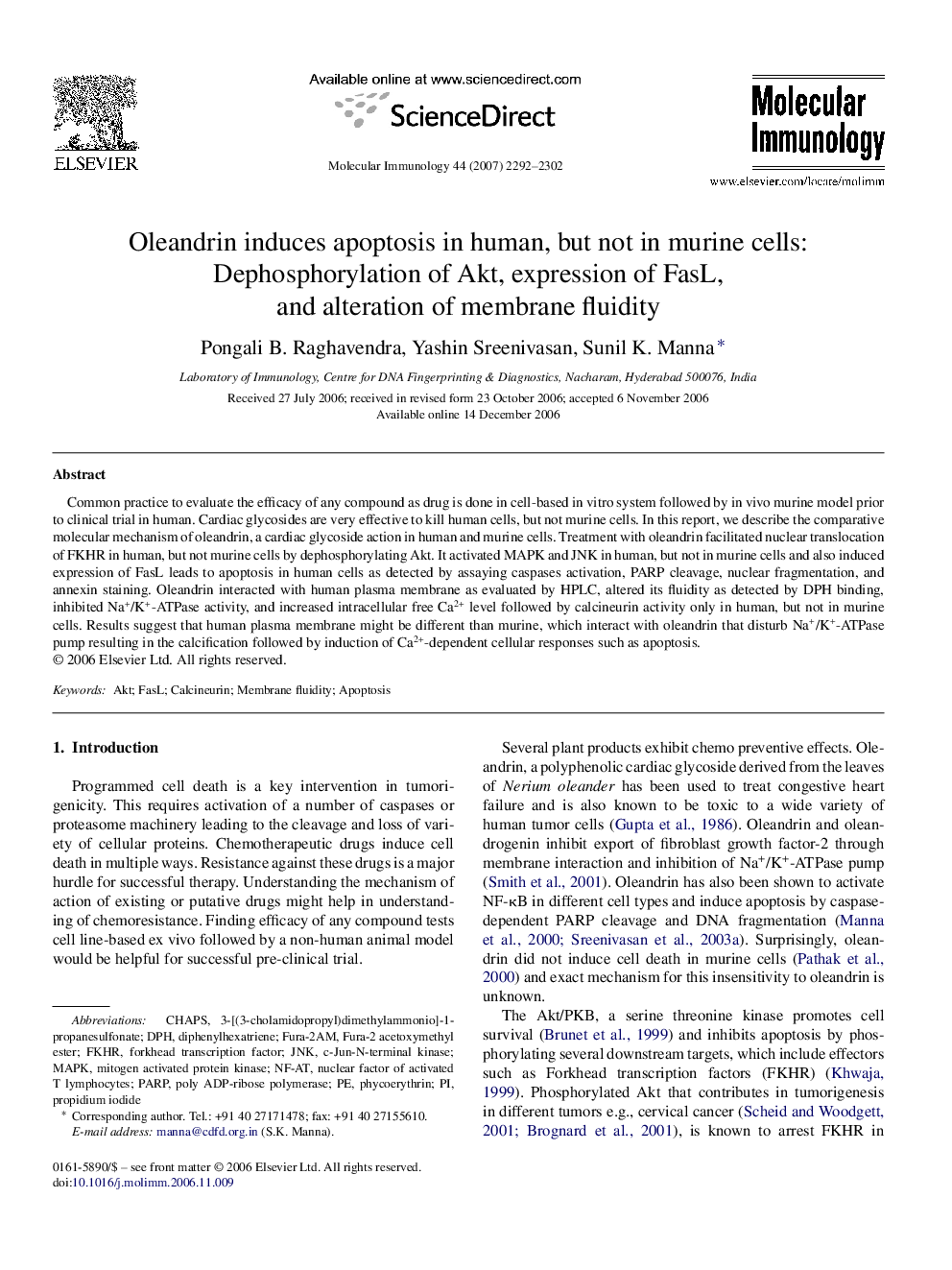| کد مقاله | کد نشریه | سال انتشار | مقاله انگلیسی | نسخه تمام متن |
|---|---|---|---|---|
| 2832236 | 1163832 | 2007 | 11 صفحه PDF | دانلود رایگان |
عنوان انگلیسی مقاله ISI
Oleandrin induces apoptosis in human, but not in murine cells: Dephosphorylation of Akt, expression of FasL, and alteration of membrane fluidity
دانلود مقاله + سفارش ترجمه
دانلود مقاله ISI انگلیسی
رایگان برای ایرانیان
کلمات کلیدی
JnkFKHRNF-ATPARPDPHc-Jun-N-terminal kinase3-[(3-cholamidopropyl)dimethylammonio]-1-propanesulfonate - 3 - [(3-کلامیدوپروپیل) دی متیل آمونیو] -1-پروپان سولفوناتFura-2AM - FURA-02:00MAPK - MAPKAkt - آکتFura-2 acetoxymethyl ester - اتوکسی متیل استر فورا 2Apoptosis - خزان یاختهایDiphenylhexatriene - دیفنیل هگزاتریلMembrane fluidity - سیالیت غشاییFasL - فاسدforkhead transcription factor - فاکتور رونویسی فورچونphycoerythrin - فایکوئیریدینmitogen activated protein kinase - پروتئین کیناز فعال Mitogen فعال استPropidium iodide - پروتئین یدیدpoly ADP-ribose polymerase - پلی ADA-ribose پلیمرازCHAPS - چاپسCalcineurin - کلسینورین
موضوعات مرتبط
علوم زیستی و بیوفناوری
بیوشیمی، ژنتیک و زیست شناسی مولکولی
زیست شناسی مولکولی
پیش نمایش صفحه اول مقاله

چکیده انگلیسی
Common practice to evaluate the efficacy of any compound as drug is done in cell-based in vitro system followed by in vivo murine model prior to clinical trial in human. Cardiac glycosides are very effective to kill human cells, but not murine cells. In this report, we describe the comparative molecular mechanism of oleandrin, a cardiac glycoside action in human and murine cells. Treatment with oleandrin facilitated nuclear translocation of FKHR in human, but not murine cells by dephosphorylating Akt. It activated MAPK and JNK in human, but not in murine cells and also induced expression of FasL leads to apoptosis in human cells as detected by assaying caspases activation, PARP cleavage, nuclear fragmentation, and annexin staining. Oleandrin interacted with human plasma membrane as evaluated by HPLC, altered its fluidity as detected by DPH binding, inhibited Na+/K+-ATPase activity, and increased intracellular free Ca2+ level followed by calcineurin activity only in human, but not in murine cells. Results suggest that human plasma membrane might be different than murine, which interact with oleandrin that disturb Na+/K+-ATPase pump resulting in the calcification followed by induction of Ca2+-dependent cellular responses such as apoptosis.
ناشر
Database: Elsevier - ScienceDirect (ساینس دایرکت)
Journal: Molecular Immunology - Volume 44, Issue 9, March 2007, Pages 2292-2302
Journal: Molecular Immunology - Volume 44, Issue 9, March 2007, Pages 2292-2302
نویسندگان
Pongali B. Raghavendra, Yashin Sreenivasan, Sunil K. Manna,